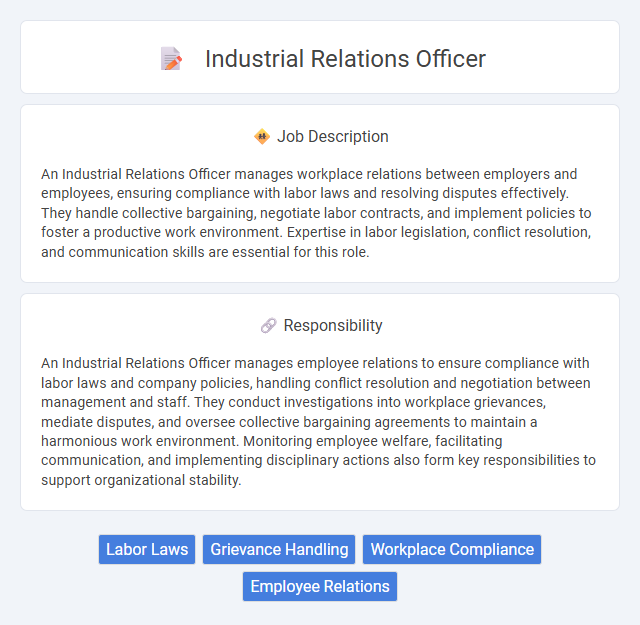
An Industrial Relations Officer manages workplace relations between employers and employees, ensuring compliance with labor laws and resolving disputes effectively. They handle collective bargaining, negotiate labor contracts, and implement policies to foster a productive work environment. Expertise in labor legislation, conflict resolution, and communication skills are essential for this role.
Individuals with strong interpersonal skills and a keen understanding of labor laws are likely to excel as Industrial Relations Officers. Those who thrive in conflict resolution and can maintain fairness under pressure are probably well-suited for this role. People who prefer routine tasks or lack empathy might find this position challenging and less compatible with their abilities.
Qualification
An Industrial Relations Officer typically requires a bachelor's degree in human resources, labor relations, business administration, or a related field. Professional certifications such as the Society for Human Resource Management (SHRM) Certified Professional or the Chartered Institute of Personnel and Development (CIPD) membership enhance credibility and career prospects. Strong knowledge of labor laws, negotiation skills, and conflict resolution techniques are essential qualifications for effectively managing employee relations and ensuring compliance.
Responsibility
An Industrial Relations Officer manages employee relations to ensure compliance with labor laws and company policies, handling conflict resolution and negotiation between management and staff. They conduct investigations into workplace grievances, mediate disputes, and oversee collective bargaining agreements to maintain a harmonious work environment. Monitoring employee welfare, facilitating communication, and implementing disciplinary actions also form key responsibilities to support organizational stability.
Benefit
An Industrial Relations Officer likely benefits from enhanced conflict resolution skills, improving workplace harmony and productivity. They probably gain expertise in labor laws and negotiation techniques, which increases their value to employers. This role may also offer career growth opportunities within human resources and organizational management sectors.
Challenge
An Industrial Relations Officer is likely to face the challenge of managing complex disputes between employees and management, requiring strong negotiation and conflict resolution skills. The role probably demands navigating evolving labor laws and organizational policies, which can complicate maintaining harmonious workplace relations. There may also be pressure to balance company objectives with employee satisfaction, making impartial decision-making essential.
Career Advancement
An Industrial Relations Officer plays a pivotal role in managing labor disputes, negotiating collective agreements, and ensuring compliance with labor laws, which serves as a foundation for career growth in human resources and labor management fields. Mastery in conflict resolution, employment law, and strategic communication enhances opportunities for advancement into senior HR roles, labor relations consultancy, or organizational development positions. Continuous professional development through certifications such as Certified Labor Relations Professional (CLRP) significantly boosts the potential for leadership roles within unions, corporations, or government agencies.
Key Terms
Labor Laws
Industrial Relations Officers specialize in interpreting and enforcing labor laws to ensure compliance within organizations. They manage employee relations by resolving disputes, conducting negotiations, and implementing policies aligned with local and international labor regulations. Expertise in labor laws such as the Fair Labor Standards Act (FLSA) and the National Labor Relations Act (NLRA) is essential for minimizing legal risks and fostering a productive work environment.
Grievance Handling
Industrial Relations Officers specialize in grievance handling by addressing employee complaints and disputes promptly to maintain workplace harmony. They investigate issues, mediate between staff and management, and ensure compliance with labor laws and company policies. Effective grievance resolution enhances employee satisfaction and reduces the risk of industrial conflicts.
Workplace Compliance
An Industrial Relations Officer ensures workplace compliance by interpreting labor laws and organizational policies to resolve employee grievances and prevent disputes. They conduct regular audits and training sessions to maintain adherence to employment standards, health and safety regulations, and collective bargaining agreements. Their role is critical in fostering a fair work environment while minimizing legal risks for the company.
Employee Relations
An Industrial Relations Officer specializes in managing employee relations by addressing workplace conflicts, ensuring compliance with labor laws, and fostering positive communication between management and staff. They conduct investigations into employee grievances, implement conflict resolution strategies, and promote a collaborative work environment to enhance productivity and employee satisfaction. Expertise in employment legislation, negotiation skills, and understanding organizational behavior are critical for effectively supporting workforce stability and minimizing industrial disputes.
 kuljobs.com
kuljobs.com